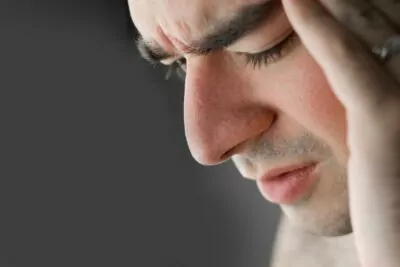
If you get migraine headaches, there’s about a 90% chance that you also have photophobia, or extreme light sensitivity. In fact, photophobia and migraine have a close enough relationship that light sensitivity has become part of the process of diagnosing migraine. If you have photophobia and are prone to headaches, light may be a major trigger for you. You may want to retreat into darkness at the very thought of getting a migraine.
“I suffer from migraines frequently,” says Meagen from Illinois. “I work in a hospital and go to pharmacy school, so I attribute a lot of screen time and exposure to fluorescent lights as the triggers for my migraines.”
Meagen gets at least 10 migraines a month. She chose to try migraine glasses made by Axon Optics to get some relief. Light is a major aggravation of her attacks, and she’s not alone.
According to a controlled study of migraine sufferers, 29% of those surveyed said bright lights caused their headaches. 73% said bright lights aggravated their headaches (along with other factors, such as stress or skipping regular meals). Fortunately, many migraine sufferers have discovered glasses with a special tint proven to reduce the pain and frequency of migraines. More on that later.
People With Photophobia Can’t Just “Let Their Eyes Adjust”
Unlike most of us who automatically squint when we turn on the light in a dark room or step out of a movie theater into daylight, people with photophobia experience bonafide pain under bright light. It’s not a matter of letting the eyes adjust; in people with photophobia, it’s a medical condition with a physiological cause. And when light sensitivity brings on a migraine attack, the pain can last hours or even days.
Don’t Retreat Into the Dark
Light may trigger or aggravate the pain experienced by many migraine sufferers, tempting them to shut the blinds or wear sunglasses indoors. While this may bring short-term relief, it’s not a solution and could actually make light sensitivity worse.
According to Dr. Bradley Katz, neuro-ophthalmologist at the John A. Moran Eye Center at the University of Utah, “Instead of resorting to sunglasses or a dark room, there are better ways to reduce the amount of painful light. While your natural reaction may be to put on sunglasses or sit in a dark room, you need to remember that not all light is causing the problem. Rather than avoiding all types of light, it’s better to filter only the most harmful light.”
Studies have shown that certain wavelengths of light are more problematic for people with photophobia than other types of light on the spectrum. And a study completed in late 2020 concludes that “artificial lighting strategies may be used to limit the lighting conditions leading to photophobia.” One of those strategies is migraine glasses.
Filter Out the Problem Light & Go About Your Day
A 2016 study conducted by researchers from the John A. Moran Eye Center at the University of Utah Health Sciences Center identified specific light wavelengths that are particularly disruptive to migraine sufferers. They found that specially tinted lenses are an effective way to filter out the troublesome wavelengths, alleviating migraine pain and frequency of attacks. The same lenses were also effective in treating overall light sensitivity in patients diagnosed with photophobia.
Migraine glasses are designed to filter out only the specific types of light known to be troublesome. For many users, the effect is the ability to go into stores, offices, and other environments without pain.
Meagen from Illinois explains, “When I wore my glasses to work I did not have a migraine the whole day! I did not experience eye pain or any discomfort when wearing my glasses.”
Evidence of how well migraine glasses work was revealed in a Headache Impact Test (HIT-6) conducted in May 2020, which showed a high majority of headache sufferers can benefit from wearing migraine glasses. The study asked 230 users about the impact headache had on their lives, both before and after wearing precision-tinted migraine glasses for 30 days. During the study period, 85% of respondents reported decreased headache impact. The number of participants suffering from daily headaches dropped from 85 to 50 — a 41% decrease. Read more about the study here.
Clearly, the precision tint of migraine glasses has the potential to reduce migraine attacks and lessen pain during a migraine. Migraine glasses may help you be more productive at work and keep social commitments, too.
 NO MORE GLARE
NO MORE GLARE